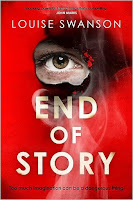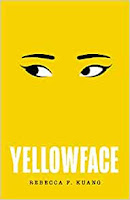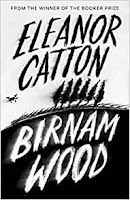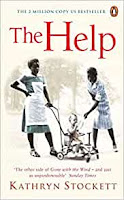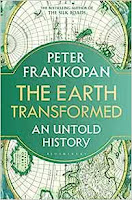Adèle:
End of Story, by Louise Swanson, is a lockdown-influenced dystopia and the premise is so ghastly (all fiction, stories etc firmly banned by the state) that I absolutely had to read it to find out what happens. I’m going to say very little about it so as not to spoil the pleasure of anyone coming to this book for the first time. Try and avoid looking up any reviews…that way, the twists as they occur will be all the more startling. I’m looking forward to seeing what this author does next. She manages a many-layered story with terrific virtuosity.
Yellowface, by Rebecca F Kuang, is the kind of book I call a “frying onions” book. Once I start one of these, I really can’t put it down, even to cook and I’ll be stirring a pot with one hand and holding the book up to read with the other. This is a story of a writer becoming hugely successful by stealing another writer’s novel. It’s tremendously good about the often mad world of publishing, and such hot button topics as cultural appropriation. Though there are various bones one could pick with it, while you’re actually reading this book you notice none of them. It was a huge bestseller, and Rebecca E Kuang has a big following as a fantasy writer.
The North Shore by Ben Tufnell is the last book I read, but it’s so unusual and so perfectly conceived and written that I know it will stay with me in a way that only special books can. I’m not sure what to call it or how to describe it. It helps to know that the author is also a botanical illustrator, and a curator and knows a great deal about art. It’s a short book, and only partly a story about a storm on the Norfolk coast and what or who a teenage boy brings into his house…weaving in and out of this plot strand are short essays about all kinds of things and careful digressions in which various works of art are described and considered. The Green Man makes several appearances and Linda Newbery (of this parish) will be especially pleased about that. I can’t urge this book o you enough. It’s mind-boggling. I was tremendously grateful to have my phone handy, ready to look up specific art works on Google as I went along. It’s a book that has echoes of W G Sebald here and there but which is really unclassifiable. I loved it.
Linda:
Eleanor Catton won the Booker Prize for The Luminaries, a Victorian mystery which was adapted for TV. Birnam Wood, a very different follow-up, also set in her native New Zealand, pitches a group of guerilla gardeners, led by the idealistic Mira, against Lemoine, a venture capitalist; both have ambitions, very different ones, for a farm abandoned after a landslip, and without the knowledge of the owner. When Tony Gallo, former member of Birnam Wood and aspiring journalist, learns of the deal struck between Mira and Lemoine, he's horrified that Mira has so readily sacrificed the group's ideals, and conducts his own investigation into Lemoine's activities. A catastrophic accident raises the already high tension, leading to a high-octane denouement. A compellingly literary and character-driven eco-thriller.Naturalist Colin Tudge is well known for The Secret Life of Birds and The Secret Life of Trees. I was lucky to hear him speak recently; he's immensely knowledgeable and an engaging thinker. The Great Re-Think is an ambitious and heartfelt project in which he examines sustainability, government, ethics, environment (though 'biosphere' is his preferred term, 'environment' having been degraded by over-use and commodification), food and farming, the past and the future of how we see the planet and our place in it. His outline is that "All human action should be guided by moral/metaphysical principles on the one hand, and by the principles of ecology on the other"; neoliberalism has led to a belief that we can ignore planetary and ecological boundaries in our quest for endless growth. We do indeed need a great re-think of how we use and abuse the planet's resources - and urgently. If only there were the political will for this to happen ...The Help by Kathryn Stockett is set in 1960s Jackson, Mississipi, 'where black maids raise white children but can't be trusted not to steal the silver'. College graduate and would-be writer Skeeter returns home to find that the maid who reared her, and whom she loved, has been dismissed. Setting herself apart from her privileged social group, she finds her niche as an author when she determines to give a voice to the black maids who service their homes and bring up and love their employers' children, only to see those children trained to share their parents' prejudice. It's been criticised as a 'white saviour' novel (of the kind condemned in Adèle's choice Yellowface), and Viola Davis, who played Aibileen in the film, said afterwards that she wouldn't now take the role, as she felt that the film wasn't focused enough on the black characters. But the novel, moving between the perspectives of Skeeter, Aibileen and Minny, does give powerful insights into the background and daily lives of black women and the stark differences between their homes and neighbourhoods and those where they work (and don't miss the Afterword by Kathryn Stockett). In fact, if anyone is thinly-drawn, in my view it's a couple of the bitchy, entitled white employers. If you've read the novel or seen the film, what do you think? Have to say that I found it completely gripping and sympathetic.
Celia:
I’ve always been a fan of the brooding, complicated, brainy detective – from Sherlock Holmes to Hieronymus Bosch by way of Adam Dalgleish. I can now add Jane Harper’s Aaron Falk to the list. I also like a good detective series and have now read all three of the books that feature Falk as the hero. I was upset to read that Exiles might be the last. Apart from their likeable hero, the books share seemingly effortlessly clever, seamless plotting. As a writer, I’m always looking for the sleight of hand, the shadow of the puppeteer’s strings. Each of the novels begins with a profound puzzle. As with all good puzzles, the solution is impossible to predict but ultimately completely convincing. It’s the steps leading to it that make for such compulsive reading. The novels are set in Australia and the continent itself is a powerful presence. The people, the landscape, the weather, extreme or benign, make these novels very much of their place. I’ve never really wanted to visit Australia, they have poisonous spiders and snakes, but after reading Exiles, I was prepared to brave such dangers and go to see this extraordinary place for myself.Broken Light, by Joanne Harris, is as brilliant as the shards alluded to in the title. Many of the chapters are prefaced with a quotation from Alfred Lord Tennyson’s The Lady of Shallot and mirrors, glass, brittle, sharp reflective surfaces, provide a running motif from the first chapter to the last. As does Magic. Joanne Harris is a clever, restless writer who has written in many different genre since her beginning in the Magic Realism of Chocolat. Magic Realism is a notoriously difficult genre to handle and Joanne Harris does it superbly, walking a razor thin line between reality and, well, magic. The book begins with the memory of a magic show, a dazzlingly beautiful female magician, the Great Corovnik, and a trick done by mirrors. It also begins with a dream about woman being murdered in a local park: #shewasonlyrunning. The dream and the memory belong to Bernie Moon, late forties, menopausal and vanishing fast. Now she is remembering the words whispered by the Great Corovnik to her eight year old self: Make them look and Bernie does just that. Joanne Harris acknowledges Stephen King’s Carrie as one of her sources of inspiration. In King’s novel, the onset of womanhood unleashes her superpower. Joanne Harris reverses this, one of her many mirror tricks. The child Bernie had a superpower, she could see into people’s lives, into their minds, into their ‘houses’ but with her first period, she lost that power. The onset of the menopause brings it back - with a vengeance. Instead of accepting the invisibility brought on by having reached ‘a certain age’, Bernie comes to see who she really is and she Makes Them Look!
Adèle Geras and I are enthusiastic supporters of The Rest is History podcast, hosted by Tom Holland and Dominick Sandbrook. The podcast ranges far and wide. I’m constantly learning new things and new ways of looking at history: areas I already thought I knew about, subjects completely new to me. In March, they broadcast an episode rather alarmingly titled, Climate Apocalypse. Their guest was Peter Frankopan, Professor of Global History at Worcester College, Oxford and author of The Silk Roads: A New History of The World. His latest book, The Earth Transformed: An Untold History, is if anything even more ambitious. A history of the world, written from a fundamentally environmental perspective and spanning time from c.4.5bn BC to the present. Truly global in scope, Frankopan examines the powerful effect of environmental change, how it has shaped life on earth and the lessons we can learn from previous civilisations and their responses, or their persistent failure to respond, to changes in climate. Ambitious indeed, and a very lengthy read, but fascinating and informative. As an early adopter of James Lovelock’s Gaia theory, I found it very interesting indeed and in a week when global temperatures have reached historic highs and wild fires rage across several continents, it couldn't be more timely.
What are your best reads of the year so far? Please tell us in the comments! (They don't have to be new books.)



